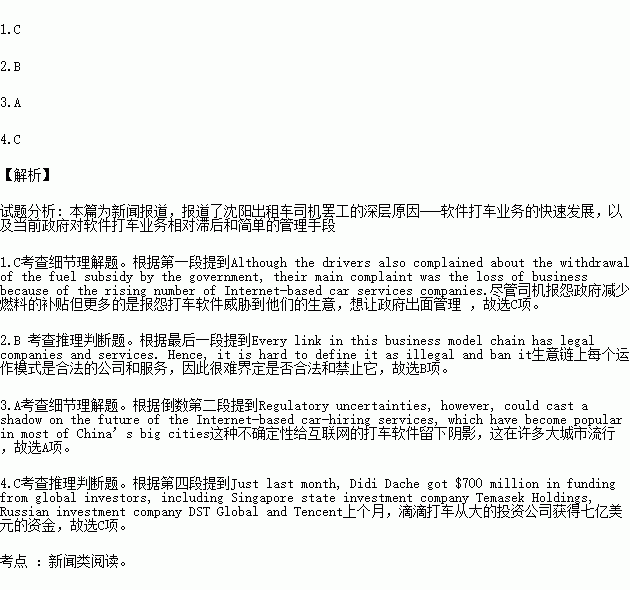题目内容
Thousands of taxi drivers in Shenyang, Liaoning province, reportedly blocked streets with their vehicles on Sunday in protest against unlicensed vehicles using taxi-hiring apps (打车软件) and apps-based car rental companies providing passenger services, including high-end cars. Although the drivers also complained about the withdrawal of the fuel subsidy by the government, their main complaint was the loss of business because of the rising number of Internet-based car services companies.
On Wednesday, news reports came that Beijing transport authorities will take measures to stop the illegal “taxi business” of private cars through the newly rising Internet apps, following the footsteps of Shenyang and Nanjing.
It is not yet clear how the Shenyang city government will handle the issue and whether it will declare the services offered by market leaders such as Didi Dache, a taxi-hiring app provider backed by Tencent Holdings, and Kuaidi Dache illegal. But Shanghai transport regulators have set a rule, by banning Didi Zhuanche, or car services offered by Didi Dache in December.
Such regulations will cause a setback to the car-hiring companies and investors that are waiting to cash in on the potentially booming business. Just last month, Didi Dache got $700 million in funding from global investors, including Singapore state investment company Temasek Holdings, Russian investment company DST Global and Tencent. Besides, the market is uncertain that Kuaidi Dache is about to finalize its latest round of funding after getting $800 million from global investors.
Regulatory uncertainties, however, could cast a shadow on the future of the Internet-based car-hiring services, which have become popular in most of China’s big cities. To be fair, these companies’ business model is anything but bad. For example, Didi Zhuanche works side by side with established car rental companies to provide high-end car service mainly for businesspeople through the Internet and mobile phone apps.
Every link in this business model chain has legal companies and services. Hence, it is hard to define it as illegal and ban it.
1.Why did taxi drivers in Shenyang block the streets with their vehicles?
A. Because they wanted the authority to increase their driving allowances.
B. Because they wanted to be taught how to use the taxi-hiring apps.
C. Because they wanted to make their main complaints known to the authority.
D. Because they wanted to appeal to passengers not to hire the private cars.
2.The author’s attitude to banning internet car-hiring service is______.
A. positive B. negative C. neutral D. unclear
3.Which of the following statements is false according to the passage?
A. The problem referred to in the passage exists in all cities
B. App-based car rental is functional to some degree
C. The government should regulate the app-based car rental market
D. Didi Dache is a China-foreign joint company
4.we can learn from the passage that _____.
A. Shenyang forbade apps-based car rental companies
B. Shanghai is the second city banning Didi Zhuanche
C. some international investment companies have strong faith in the future of apps-based car rental companies
D. it is not difficult to picture the apps-based car rental companies illegal
 天天向上一本好卷系列答案
天天向上一本好卷系列答案 小学生10分钟应用题系列答案
小学生10分钟应用题系列答案

 ent know where you’re going is always a good idea.
ent know where you’re going is always a good idea. nd win their trust.
nd win their trust.